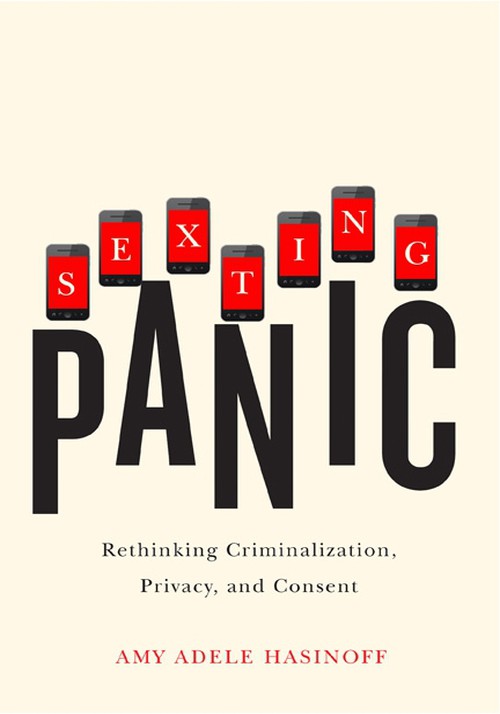
Sexting Panic
About the Book
Sexting Panic illustrates how anxieties about technology and teen girls' sexuality distract from critical questions about how to adapt norms of privacy and consent for new media. Though mobile phones can be used to cause harm, Amy Adele Hasinoff notes that criminalization and abstinence policies meant to curb sexting often fail to account for the distinction between consensual sharing and the malicious distribution of a private image. Hasinoff challenges the idea that sexting inevitably victimizes young women. Instead, she encourages us to recognize young people's capacity for choice and recommends responses to sexting that are realistic and nuanced rather than based on misplaced fears about deviance, sexuality, and digital media.About the Author
Amy Adele Hasinoff is an assistant professor of communication at the University of Colorado Denver.Reviews
"The author’s aim is to propose alternative ways to deal with gender and sexual victimization, to think about youth’s rights for self-expression, and to respect their consent and privacy. Hasinoff also provides practical recommendations for concerned readers, legislators and prosecutors, and teachers and educators. Highly recommended."--Choice"In an age of heightened concern over rape culture and sexualization in the media, Amy Adele Hasinoff's (2015) Sexting Panic is one of the most insightful, concise, and necessary works to emerge in recent feminist media studies."--Journal of Communication
"In Sexting Panic Hasinoff convincingly argues that academics and the general population alike must begin to complicate normative perceptions of teens sexting and sexuality. . . . Sexting Panic is engaging and thought-provoking, and it puts forth a reconceptualization of the relationship between technology and sexuality that is unique, timely, and necessary." --Feminist Media Studies
"Hasinoff's alternative narrative pushes back against the dominant narrative of sexting as some type of technological, legal, sexual, and moral crisis. . . . She has carefully and skillfully articulated a comprehensive analysis of sexting and has provided a mediating antidote to the media-driven moral panic."--Critical Criminology
"Compelling. . . . Academic-activist orientation brings together interdisciplinary scholarly rigor and insightful feminist analysis about sexting while opening the conversation to include educators and policymakers, and of course young women themselves."--New Media & Society
"This is a well-written and approachable book, offering an engaging and nuanced understanding of the complexities of a usually misconstrued cultural practice."--Information, Communication, and Society
"Hasinoff boldly challenges us to question the assumption that sexting is the outgrowth of a lack of self-esteem or the result of gendered naivete. . . . A strong and vital contribution to feminist media studies."--Journal of Popular Culture
"Sexting Panic is a very interesting book and Hasinoff does well in presenting research on a complex issue in a way that is approachable and straightforward to readers."--Criminal Justice Review
"Hasinoff does an admirable job at providing an alternative perspective based on agency and consent."--Sexualities
"In this excellent and provocative book, Hasinoff dissects the moral panic around texting and offers some very sensible ways forward for how best to deal with the human harms associated with it."--European Journal of Communication
"Besides contributing to the literature on feminist media studies, youth media participation and production, and digital communication policy, Sexting Panic also illuminates the necessity for media literacy initiatives that recognize teens' power and agency as mobile media users. The book presents compelling arguments for media education that emphasizes respect for privacy and consensual interaction."--Mobile Media & Communication
Blurbs
"Sexting has brought together two things that adults fear most--teens' sexuality and technology. Sexting Panic is a fantastic antidote to the media-driven moral panic. . . . Hasinoff's thoughtful book offers a framework for rethinking sexual media production and the politics of consent. This is a critical intervention to a fraught topic."--danah boyd, author of It's Complicated: The Social Lives of Networked Teens
"The most comprehensive analysis of sexting so far. Amy Hasinoff gives us nuanced insights into young people's practices of sexting with a much-needed emphasis on consent and agency. This book challenges the orthodox anxieties about technology and female sexuality, while provoking us to rethink ideas of media production and information."--Kate Crawford, author of Adult Themes: Rewriting the Rules of Adulthood
"Talk about sexting has become a key site for making sense of young people's relationships with sex and technology, but it is often hampered by common-sense and frequently sexist views of girls. This book, which is clear, compassionate, and practical, argues that in order to move forward in our understanding of sexting we need to see it as an act of media production and to refocus adults' concerns about girls onto girls' rights to privacy and to a culture of consent. Amy Hasinoff's book is a major contribution to debates about sexting, sexualization, and contemporary sexual and media cultures."--Feona Attwood, editor of Mainstreaming Sex: The Sexualization of Western Culture
"Hasinoff has written a bold and provocative book that complicates prevailing assumptions that sexting is an inherently damaging practice for young women. Deftly integrating scholarship regarding adolescent female sexuality and digital media practices, Hasinoff challenges the reader to move beyond a simplistic understanding of female victimhood to embrace a more robust understanding of sexting as a potential expression of authentic desire and agency."--J. Shoshanna Ehrlich, author of Who Decides? The Abortion Rights of Teens
"Moving away from the dominance of media, legal, and educational focuses upon sexting, Hasinoff . . . covers a lot of necessary ground and brings a complex reading to sexting that the topic deserves."--Larissa Hjorth, author of Mobile Media in the Asia-Pacific: Gender and the Art of Being Mobile










